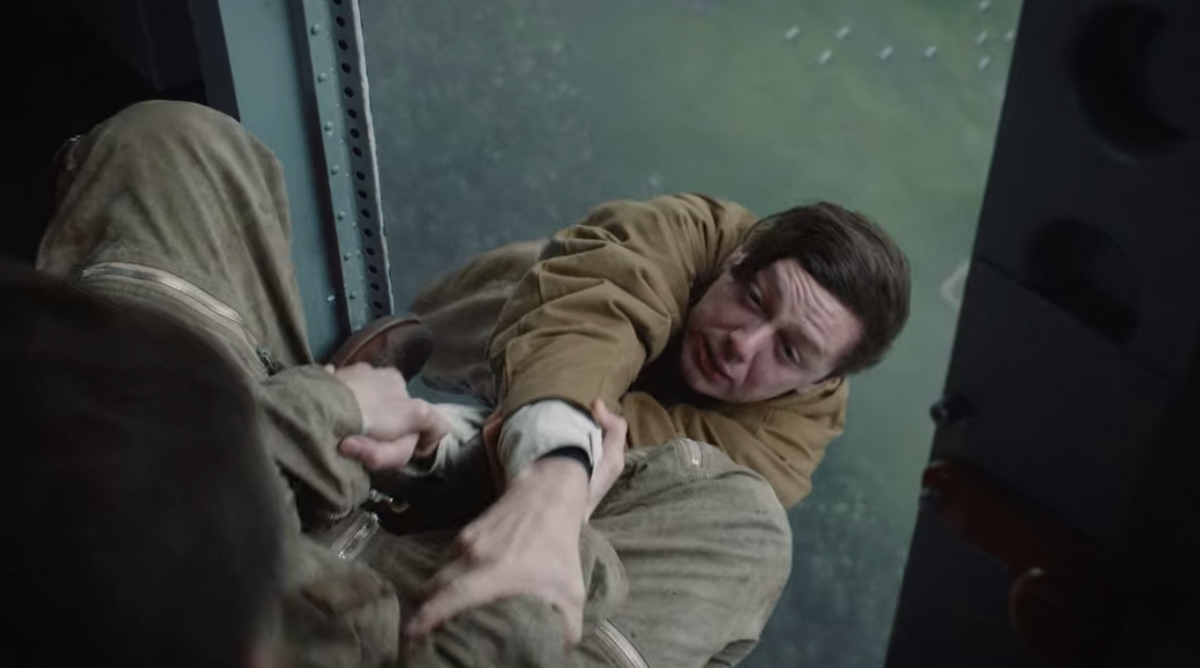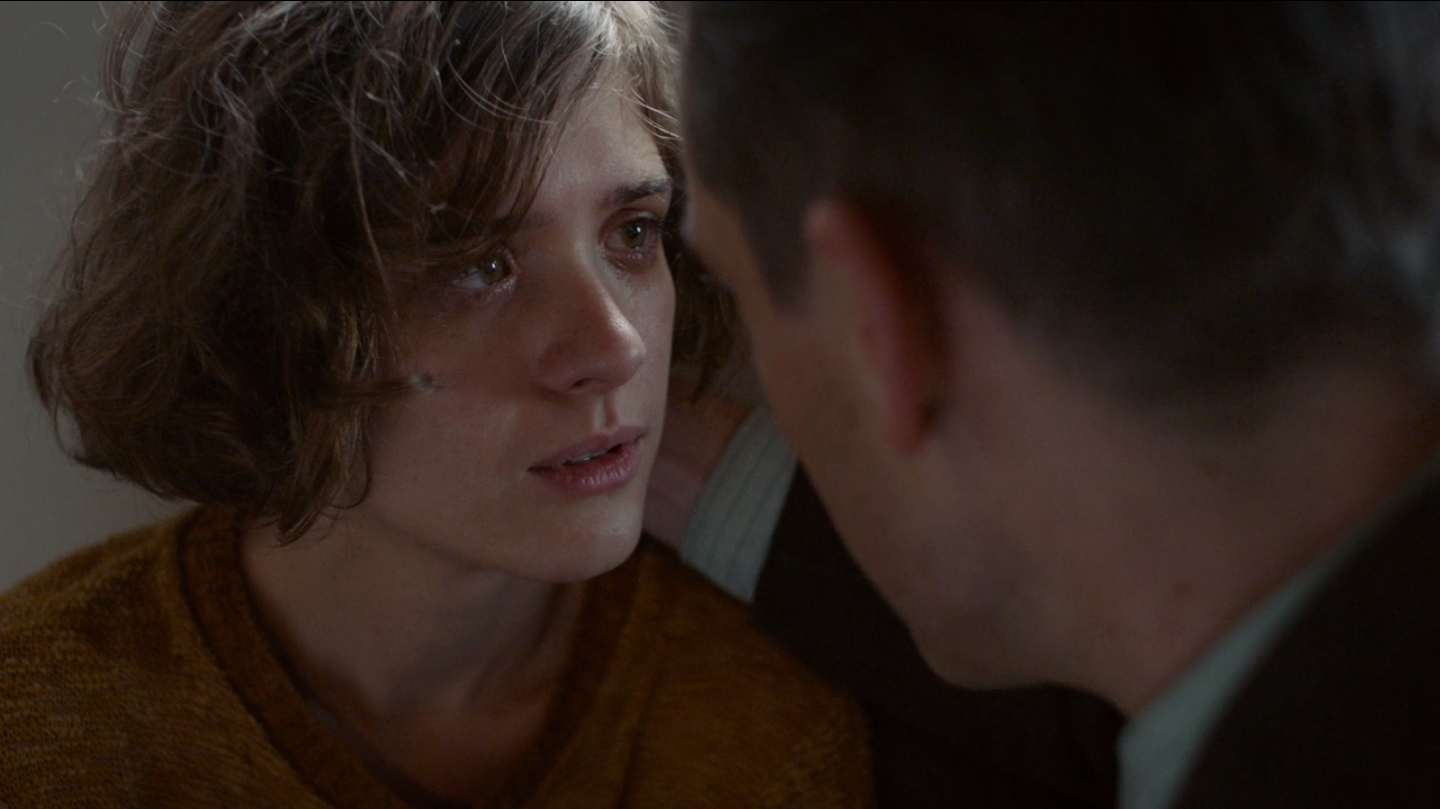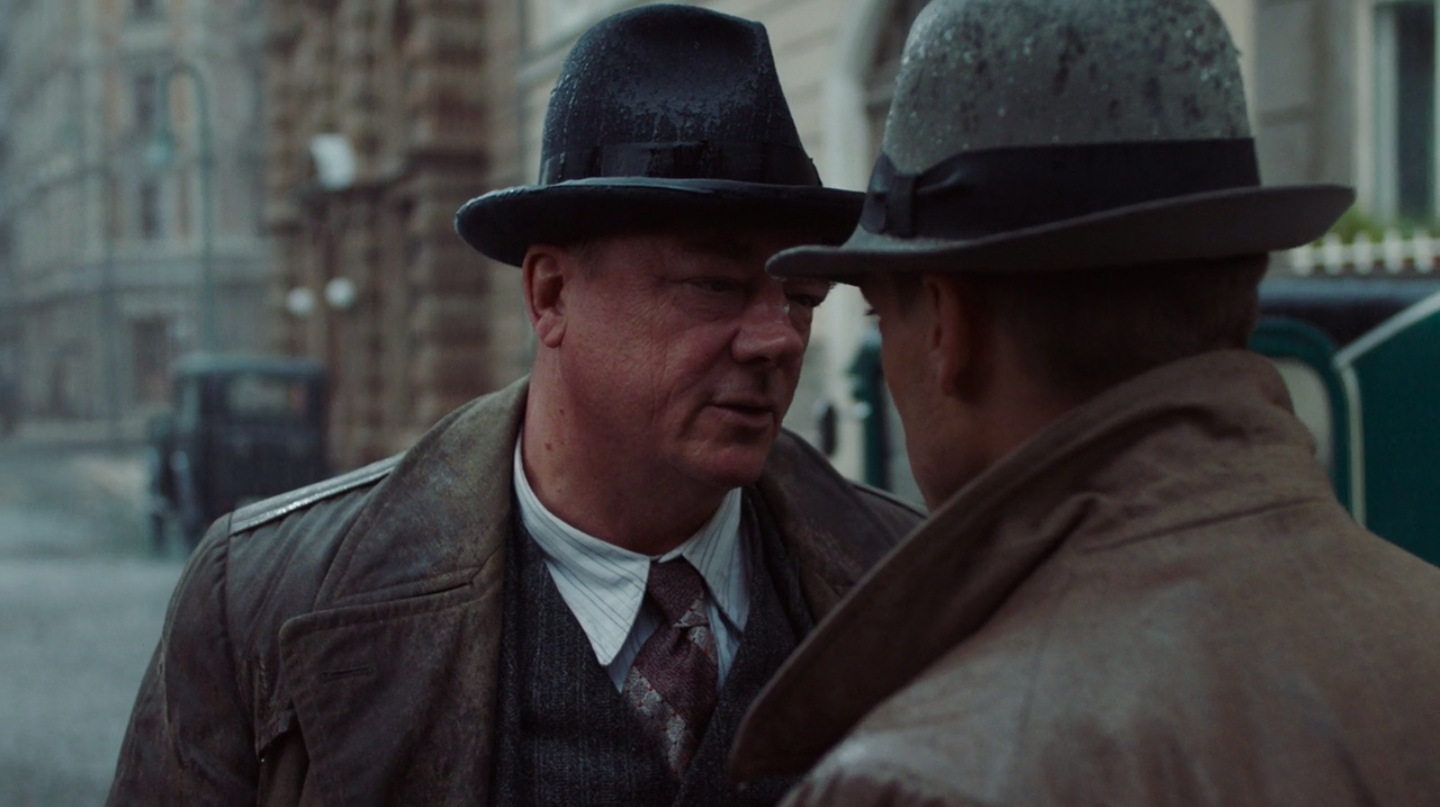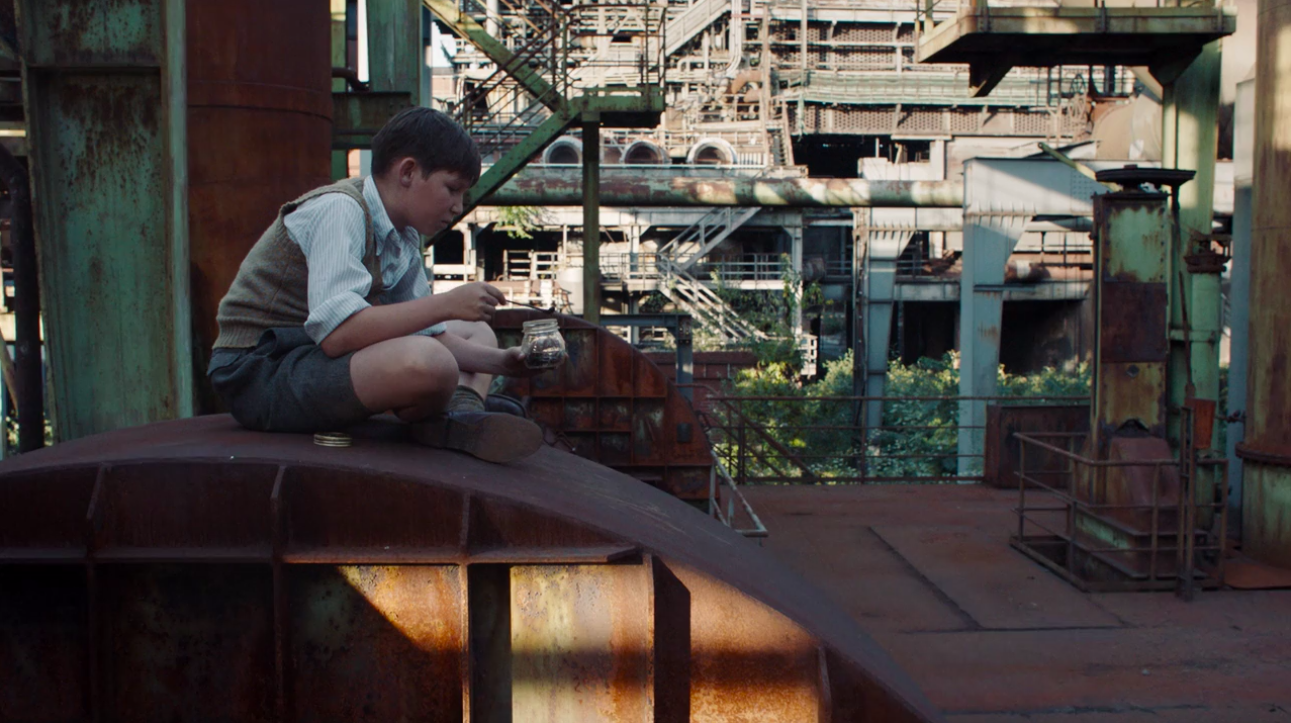Babylon Berlin: "Episode 11" and "Episode 12" (with Samantha Powell)
In which holy shit

(For the foreseeable future — aka as long as this quarantine lasts — Emily will be watching the critically acclaimed German drama Babylon Berlin, a neo-noir set in 1929 Germany. The series is available on Netflix in the United States. For every installment, she will be joined by a special guest. Today’s guest is the terrific writer and critic Samantha Powell. Find Samantha on the internet at her website and on Twitter.)

Emily: I don’t know what, precisely, I was expecting when I started Babylon Berlin, but it certainly was not a man hanging out of an airplane while trying to take photos of aircraft far below, then nearly falling out, but for Gereon seizing hold of him. It’s a wild, action-packed sequence that only highlights the ways in which season two of this show is just fucking moving.
It’s weird. I really enjoyed season one, and it did a ton of necessary character work. And I know that season two isn’t any different from season one, given its production cycle. But it really does feel like it’s zeroed in on the things that work in this show and eschewed anything else — even the things that mostly worked. Episodes are tight as a drum, the story moves forward relentlessly, and even the character beats turn out to have important plot implications.
Take, for instance, the dance sequence from “Episode 10” that Steve Greene and I talked about last week. Yes, in and of itself, it’s a lovely little character moment. But it’s also teaching you where everything is in Bruno’s house, so when you get to a sequence of Gereon stalking through that house while Bruno’s wife is home, looking for Stephan’s diary, you know exactly where he is and where Mrs. Wolter is. The dance sequence, then, serves two functions — a character function that’s obvious in the moment and a plot function that’s obvious later. That’s good television!
The increased focus of season two has made me downgrade season one a bit in my own memory. It was great! It just wasn’t anything quite like this. I want to force everybody who makes prestige television in the US to sit down and watch this thing and grapple with how it doesn’t have an ounce of fat on it, how even the character stuff turns out to be plot stuff. Like I saw the trailer for the HBO miniseries version of Perry Mason, which feels like it could have big Babylon Berlin vibes — except I also know every single episode will be at least 10 minutes too long.
There’s so much that happens in these two episodes, and I’ve touched on barely any of it. Samantha: What are your most favorite moments from these jam-packed installments?
Samantha: I'm trying to think back to why I started this show two years ago and what I expected. No one was talking about it then, and I think it was simply Netflix being extremely good at targeting me and my curiosity about Weimar Germany as a lover of history without too much prior knowledge of the era. Thank goodness I listened to the algorithm.
(I am also very excited about Moody Matthew Rhys as Perry Mason, but those episodes will absolutely be 62 minutes long, and I will complain about that fact loudly when it premieres.)
My favorite moments from these episodes aren't really action packed but more speak to the types of storytelling that I'm drawn to. I love a spy film, so the opening of “Episode 11” hit all of my sweet spots. A tense theft of top-secret documents. The elaborate set-up for the handoff and exchange of prisoners. Charlotte playing lookout.
I also liked the opening of the following episode. We all know what Moritz is going to find and that it will drastically shake up our story, but the set up of him just being a bored kid messing around on this impossibly sunny day was such a smart way to turn up the tension as we waited for that reveal — although I do feel bad for that couple who was just trying to have a nice frolic on what looked to be a beautiful day.
Oh, and of course I couldn't get enough of the forward movement of the Charlotte/Gereon ship. How many times did you watch that almost kiss? I rewound it four times on this rewatch and honestly I'm proud of my restraint.

Emily: UGH. WHAT IS UP WITH THEM NOT KISSING? I DON’T GET IT!!!
In theory, Helga should be a character I love, just so I can be contrarian. I have a long history of stanning for the obviously doomed love interests in a series that has one true pairing that will likely be together by its end. And yet I find Helga rather dull, all things considered. It’s nothing really to do with her, or the actor who plays her, and everything to do with the way that the series’ central plot just keeps gobbling up characters who aren’t necessarily involved in the incredibly complicated Reichswehr plot. (Greta is also theoretically not involved in the Reichswehr plot, but she’s Benda’s live-in maid, so you can see where she will be very soon, when Fritz kills Benda, as I suspect he will.) Helga just can’t compete with the fact that Lotte is deeply embedded in everything the story cares most about (and that therefore I care most about).
There’s also the intimacy of Lotte knowing all of Gereon’s secrets before he was willing to tell her about them. That’s an instant setup for me to sit up and take interest in a potential coupling, because a sudden and unexpected intimacy between two people, built not around sex but around information, is the kind of dynamic we sometimes see in our own lives. (I think, for instance, of the intimacy that would suddenly arise any time I would tell a friend I was trans before I was out publicly and especially early on in that process. The people I told in those days are always going to be some of my closest friends for that reason.)
And yet there’s something really potent about Helga as a character all the same because she’s not involved in the main plot. She just wants a nice, normal life, and her lover is out here, slowly unraveling a plot to undercut the fragile peace Europe has existed in since the end of World War I. And because we know that peace will be shattered eventually, there’s a tragedy to every scene with her. Helga wants a normal life that will never, ever arrive. It’s poignant.
But it’s also mismatched with the dramatic stakes for every single other character, you know? And that can’t help but push her to the series’ margins just a little bit.
So it turns out that Steve and my predictions from last week that Bruno was the man who shot Stephan were correct. (To be fair, the show didn’t exactly try to hide this from us.) And the sequence in which both Bruno and Gereon realize the other has committed murder — in the middle of a police briefing, no less — is one of the best scenes this show has done yet. I’m still impressed by how this series set up Bruno to be a friendly confidante to our protagonist, then undercut that so brutally. How do you feel about his “heel turn” (if it can even be called that)?
Samantha: Did you catch Gereon taking a moment to caress that drawing of Charlotte when he was stealing the notebook? Sigh.
Helga and Greta both feel very much on the sidelines at the moment, more being pulled along by the actions of other characters than having any action of their own. (Even Moritz is more involved in the central plot, if only accidentally so.) They also both seem pretty happy, which is a real contrast to everyone else, especially in “Episode 12,” as we see the fallout from Stephan's murder.
But in a show as dark as this one in what we the audience know are the last moments before global catastrophe, I think we'll see them, if not drawn into the central plot, at least start to feel that darkness close in on them. Of course I don't think I've ever seen or read a story where someone says "I know I didn't ask you first, but I've left my entire life behind to start new one with you" end well for either party, so we'll see how that all turns out.
I also think the series has made a conscious choice to only give us small glimpses of Helga. We don't really know anything about her, which makes her a hard character to give your full attention to in the midst of poison gas trains and assassination plots. But Gereon's dream makes me feel like we'll see more very soon. You can't just give us hints of a love triangle involving two brothers and not root around in there.
The scene at the briefing where Gereon and Bruno go full Two Spider-Men meme is one of the best of the series. I don't think these two really want to be so entangled in each other's lives, and yet they can't break the cycle of being in possession of each other's secrets. And then obviously, they both share an equally close relationship with Charlotte — different in nature and origin of course but a similar level of intimacy.
I wasn't shocked by Bruno's turn. The show has never shied away from showing us his more villainous qualities. I was shocked with how earnestly he lied to Charlotte. I knew he would lie, but I did not expect him to swear on his wife's life. I think it just showed us how much he has come to care for her and how dearly he holds their friendship. Not that they gave us very long to think about that before burning it all down on Charlotte's end.

Emily: Charlotte’s kidnapping was maybe the first twist this season that made me roll my eyes a bit. She’s in possession of the all-important notebook, which could bring everything crashing down around the conspirators’ ears, and… she’s kidnapped? To extend the plot presumably? (Spoiler: I’ve watched ahead, and I’m delighted by the identity of who kidnapped her, but in the moment of watching this, I was super annoyed, so I have to play by those rules.)
The kidnapping feels cheap in a way the rest of the stuff in these episodes don’t. They’re so full of moments of weird surrealism and striking visual poetry. Gereon seeing the sun above the clouds while in the airplane, for instance, is a gorgeous image, and Graf hanging on to the plane for dear life is great too. But even beyond these feats of derring do, these episodes show a unique talent for blending together the complicated machinations of the crime and conspiracy plot with the mundane nature of everyday life in a country rapidly hurtling toward fascism.
You already called out that little moment with Moritz interrupting the lovers by dumping cockroaches on them (a wild and fun little moment), but it spoke to me as being this show in a nutshell, more or less. Here’s a normal, everyday moment in 1929 Berlin — and then it’s interrupted by a child stumbling across a dead body. It feels like an omen of what’s coming. And the mourning for Stephan that follows is beautiful, and all the more so for how subdued it is. (We never see Bruno tell Stephan’s parents what happened, for instance.) When our eager beaver go-getter was gunned down in “Episode 10,” I wondered if he could possibly inform everything that followed. He did, and then some.
I’m also struck in these episodes by how much the show is using dream sequences this season, as a way to fill in plot back story — Gereon basically hallucinates Bruno gunning down Stephan while trying to piece together the crime, and he also gets quick flashes of when he killed Father Josef — and as a way to capture the fleeting, odd feeling of being trapped on the back of a freight train hurtling right at a brick wall.
How do you feel about these dream sequences? And are there any that particularly struck you as well done in these episodes?
Samantha: I think my favorite dream sequence is the one I mentioned earlier on the plane because it reminded me of how it feels to dream. The pieces grabbed from the monotony of the current day along with long ago memories you'd rather forget. Being both watcher and participant. This dream sequence did what most do in that it gave us a look into the internal emotional quagmire of a character, but it was that piece, the reality of how it was constructed, that pulled me in.
Charlotte's kidnapping did leave me a bit thinking face emoji to begin with as it felt a bit cheap for this show and the set-up felt a iffy. But then I reminded myself that she had lost two close friends, one due to death and one due to broken trust, in a short period, so her being less sharp than she usually was made sense. Charlotte on a normal day would've picked up on the warning signs but this emotionally compromised Charlotte? Not so much.
Emily: Right. I certainly buy her missing all of those signs, but the way in which she disappears feels like a way to artificially extend the story a few more episodes — at least for now.
Thank you so much for joining me, Samantha! Where can people find your work?
Samantha: This was fun! Now that more people are watching it, I have (mostly) stopped yelling at everyone to watch Babylon Berlin, but I have not stopped inserting myself into the conversations other people are having about it.
When I'm not doing the latter, you can find me doing some writing about fashion, costumes, and other things for places like The Cut and Vulture or on my personal blogs. But usually you can just find me tweeting a lot about fashion, history books, hot people doing hot things, and whatever episode of Bob's Burgers or New Girl I'm rewatching.
Emily: And join me next week, everybody, as season two roars toward its conclusion, with “Episode 13” and “Episode 14.” I’m really excited about next week’s guest, if we can make everything work out!





